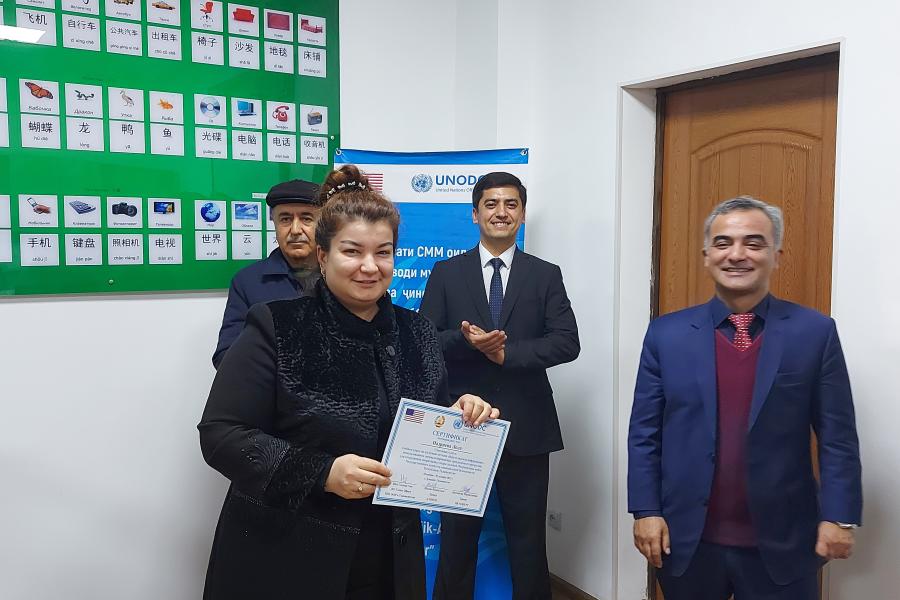UNODC in Tajikistan: Contributing to effective border control and security by training border officers
17 January 2023
Tajikistan shares almost a 1,400km border with Afghanistan - the world’s largest opium poppy producer. That makes the country vulnerable to security threats and challenges posed by transnational organized crime.
The situation is challenged by weak security along the porous Tajik-Afghan border which mostly lies in incredibly rugged mountains, and it has been very difficult for the authorities to police it.
Training the border security and management agencies forms a key component for effective and efficient border control and law enforcement activities.
In Tajikistan, UNODC supports the Border Troops of the State Committee for National Security of the Republic of Tajikistan through the enhancement of skills and expertise of staff and technical and specialized assistance.
In 2022, UNODC continued to strengthen the analytical and operational capacities of the Tajik Border Troops to better respond to threats of transnational organized crime to ensure effective border control and security.
Michael Kopper, Border Security and Law Enforcement Adviser, the U.S. Department of State’s Bureau for International Narcotics and Law Enforcement Affairs (INL) Office at the U.S. Embassy in Dushanbe, highlighted the nexus between terrorism, illicit drug trafficking and smuggling of arms. He noted that the successes of the Tajik Border Troops in countering these threats at the regional level would provide tangible benefits for global security.
Between July and December 2022, a series of training courses were conducted for 80 analyst and operations officers from the border units and divisions of the Tajik Border Troops. The trainings covered a wide range of topics.
During the trainings, border officers enhanced their capacities in conducting and managing operations and information and analytical activities to counter organized crime, including terrorism and violent extremism, illicit drug trafficking and arms smuggling. They improved their skills in using mapping software and analytical specialized software products.
The officers learned about how to counter drug smuggling through ‘green border’ zones and about technical tools to detect and identify narcotics and explosive substances.
They reviewed the national legislation that regulates operational search activities and enhanced their skills in conducting and coordinating joint operations with other law enforcement agencies of Tajikistan.
In addition, the trainings enhanced the officers’ capacities in analytical report writing and effective information-sharing with other law enforcement agencies, including the Drug Control Agency under the President of the Republic of Tajikistan - a coordinating institute of drug control, prevention and enforcement-related activities in the country.

“Tajikistan plays a critical role in countering cross-border crime, including illicit drug trafficking. UNODC trainings contribute to the enhancement of analytical, operational and information-sharing skills and knowledge of the border officers who are at the forefront of ensuring security and should be well equipped to respond to the security threats and challenges effectively,” noted Mustafa Erten, Head of the UNODC Programme Office in Tajikistan.
The feedback received from the participants at the end of the trainings was very positive. They noted that such highly informative and useful courses would enhance the efficiency of their day-to-day work.
Colonel Khushvakht Kishvarsho, Deputy Commander of the Border Troops, thanked UNODC and INL for their continued support in addressing security threats along the Tajik-Afghan border. He highlighted the UNODC’s important contribution to securing and managing the borders of Tajikistan through its border initiatives and projects. He noted that this support is vital for sustaining peace and security not only in Tajikistan but also in the wider Central Asian region.
****
The trainings were conducted as part of the Initiative on Strengthening Control along the Tajik-Afghan Border under the UNODC Programme for Central Asia 2022-2025. The initiative, aimed at strengthening the Border Troops’ capacities to counter transborder crime effectively, is in line with the National Border Management Strategy of the Republic of Tajikistan 2010-2025.
The initiative is funded by the U.S. Department of State’s Bureau of International Narcotics and Law Enforcement Affairs (INL).
For further information, please contact:
Ms. Nurangez Abdulhamidova
Communication and External Relations Officer
UNODC Regional Office for Central Asia
Email: nurangez.abdulhamidova[at]un.org

